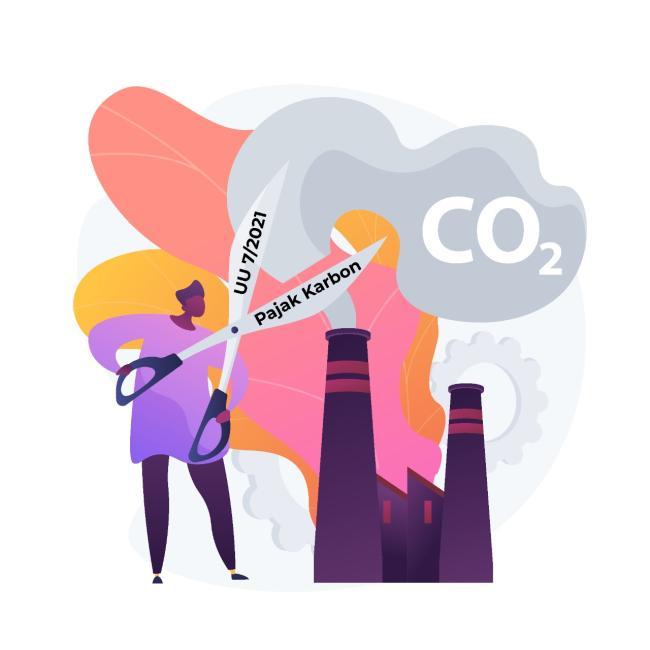Social Media Carbon Tax

By Ananta Paramita, Employee of the Directorate General of Taxes
Enthusiasm
According to DataReportal, the number of social media users in Indonesia reached 191.4 million in January 2022, out of a total population of 277.7 million. According to this data, more than half of Indonesia's total population is technologically skilled or does not stutter technologically.
Since the Covid-19 pandemic, all services have gone online. People are compelled to use technology to forecast the spread of the virus. Parents are starting to work from home, and children are starting to learn online. When confronted with this method, Indonesians arm themselves with always-on smart devices. Social media is where most guidance and news are found.
Indonesians spend an average of 8 hours and 52 minutes per day online, according to data from the British company We Are Social. It turns out that we spend more than a third of our waking hours on social media.
The Impact of The Social Media
New method, new sequence. Perhaps the sentence reflects the rapid changes in technology. New communication bases, in addition to face-to-face, new routines, and new devices. Many things have changed and will continue to change in the future. We are expected to keep up with all developments, especially with the rapid pace of technology.
Each application receives multiple updates in a single year. Even mobile phone software provides a new version to ensure that the operating system runs smoothly. These things, of course, are in line with the needs of users or a dynamic society.
Social media now allows people to be creative while also earning money for the community. Starting with content for fun can lead to income. Many celebrities, YouTubers, and TikTok creators (to name a few of the popular social media platforms currently in use) have found joy and fame through their respective social media platforms. If properly structured, their income can reach millions of rupiah. Needless to say, many people are following in their footsteps.
This one is a different story. In 2021, a teenager in Duren Sawit died as a result of being involved in a scuffle and challenging one another on social media. Social media has advantages and disadvantages when used incorrectly.
Pollution in Society
Social pollution that psychologically attacks or has an impact on an individual is not the only effect of social media users' irresponsibility. It has been discovered that the use of social media has an impact on the environment through carbon emissions.
The carbon emissions or the amount of carbon emissions (CO2) from the activities or activities of companies providing social media applications is revealed in a report from Kompas.com, an Australian comparison site, Compare The Market.
As a result, the social media platform TikTok is the leading source of carbon pollution, accounting for 2.63 percent of total emissions (gCO2Eq). The number two developer company is Reddit, and the number three developer company is Pinterest. For one year, using the top ten applications with the highest carbon footprint for 5 minutes can produce 20 kg of CO2, the equivalent of driving 84.5 kilometers.
Carbon Tax
According to Article 13 of Law No. 7 of 2021 on Harmonization of Tax Regulations, "a carbon tax is imposed on carbon emissions that have a negative impact on the environment" (1). As stated in Article 13 paragraph (5), the subject of the carbon tax is an individual or entity that purchases carbon-containing goods and/or engages in carbon-emitting activities, and when the carbon tax becomes due, it is determined at the time of purchase, at the end of the year period from the activity, and at other times as regulated in a Government Regulation.
The purpose of the carbon tax is also stated in paragraph (12) of the same article in this Law, namely "Carbon tax revenues can be allocated for climate change control."
Carbon emissions have a negative impact on the transition to decarbonization, which is necessary to create a green environment and environmentally friendly activities. Carbon taxes are a solution for limiting the amount and using them as a barter tool to repair the remaining negative effects. Indonesia is one of the countries that, through this regulation, implements a carbon tax for the benefit of the environment and its people by promoting low-carbon green economic activities.
The Ministry of Finance delayed the implementation of the Carbon Tax from April 1, 2022 to July 1, 2022. The reason for the delay was to finalize technical regulations and wait for the electricity sector to be ready as the first to be subject to a carbon tax. Rates, imposition basis, method of calculation and deposit, reporting, and a carbon footprint map are among the technical rules that have been prepared.
Carbon Emissions from Social Media
Given the purpose of the carbon tax imposed by this regulation, carbon emissions from social media activities should be considered or factored into the development of special or separate technical regulations. The carbon tax can be present as a controller due to the large number of social media users in Indonesia and the long access time per day.
Not only is it intended to limit or even prevent users from earning a living or being creative. The main goal is to put pressure on service providers to use more environmentally friendly methods. In this advanced era, the use of taxes to control the occurrence of damage is increasingly focused on improving people's lives so that they are even better without pollution.
*)This paper represents the author's personal viewpoint and does not represent the viewpoint of the institution where the author works.
- 156 views
